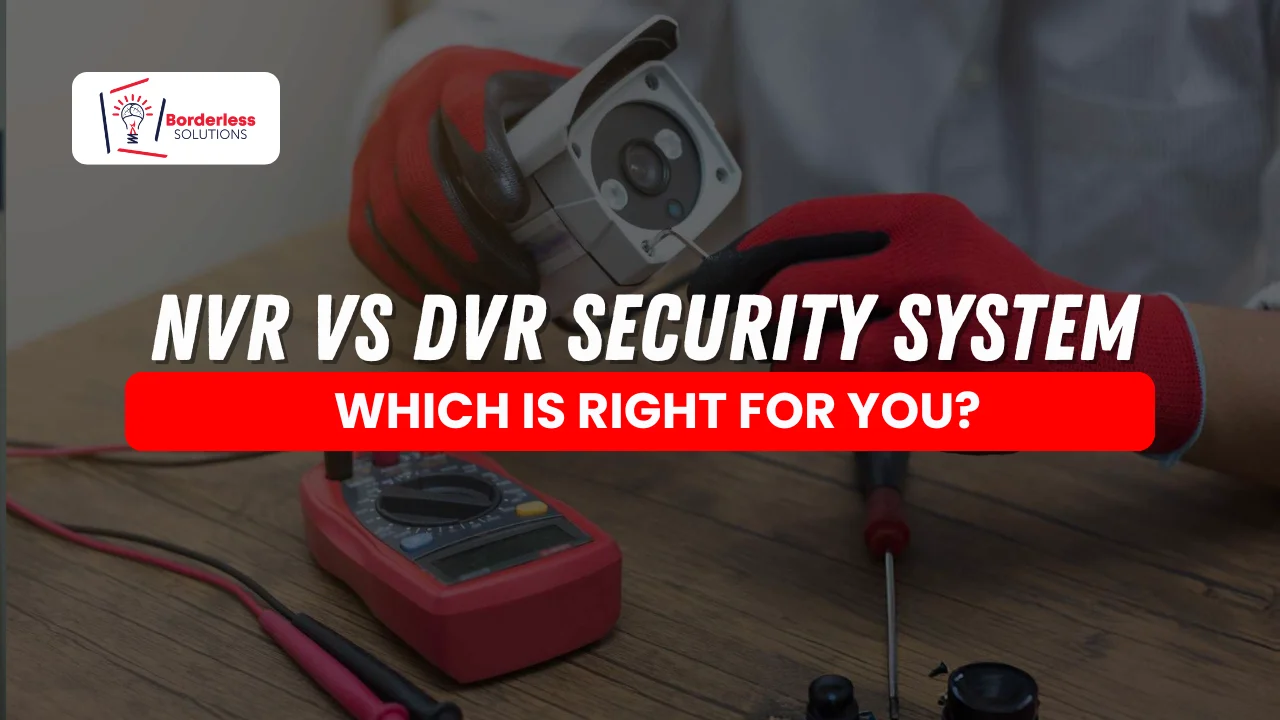When it comes to buying a video surveillance system two primary technologies that you need to choose from is Digital Video Recorders (DVR) and Network Video Recorders (NVR). Both of them are designed to capture and store the video footages but they have so much difference in terms of performance and installation. Understanding the key differences between DVR security system and NVR systems is important for choosing the right solution for your specific needs. Whether you are buying it for your small house or want to secure the large commercial property.
Video surveillance has become a most important part of both home and business security. Whether you are protecting your family or ensuring the safety for your employees and assets security systems provides a peace of mind by doing continuous monitoring and the ability to review footage if needed. As crime rates fluctuate and businesses continue to expand, having a reliable security system so much more important.
NVR vs DVR Understanding the Basics
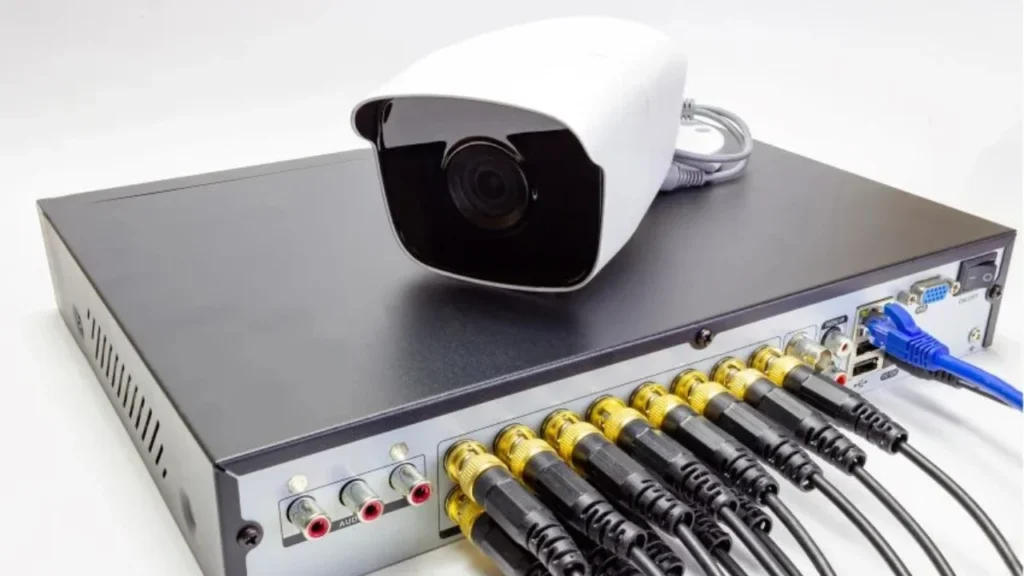
When it comes to video surveillance, the terms “DVR” and “NVR” refer to the two primary technologies used to capture and store video footage. DVR systems have been around for decades and they are working with analog cameras and coaxial cables to transmit and process video signals. These systems capture raw video from the cameras then they convert it to a digital format and store it for later viewing.
While DVR systems are more affordable and easier to install they come with limitations such as lower image quality issues. The NVR systems use digital IP cameras and offer higher video quality and easier scalability. NVRs cost more and these are harder to install. They offer better solutions for larger or more advanced security systems.
What is a DVR (Digital Video Recorder)?
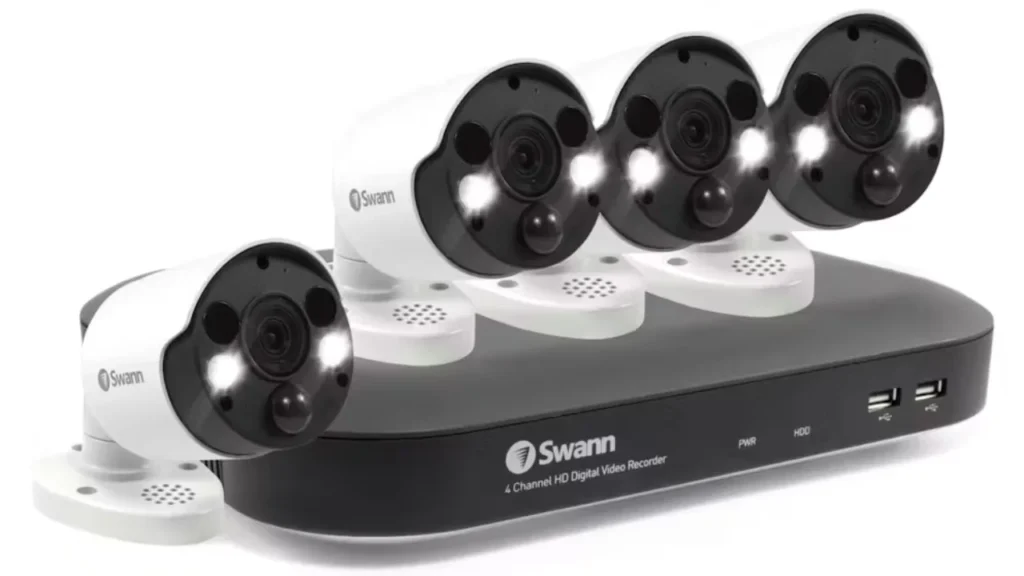
A Digital Video Recorder (DVR) is a security system that record videos from analog cameras and stores it digitally on the hard drive. It uses coaxial cables to transmit video signals from the cameras to the recorder where the footage is processed and saved. DVR systems are easy to install in smaller setups but they are limited by their dependence on analog technology cameras. Which can result in lower video quality and less flexibility compared to newer systems like NVRs.
What is NVR (Network Video Recorder)?
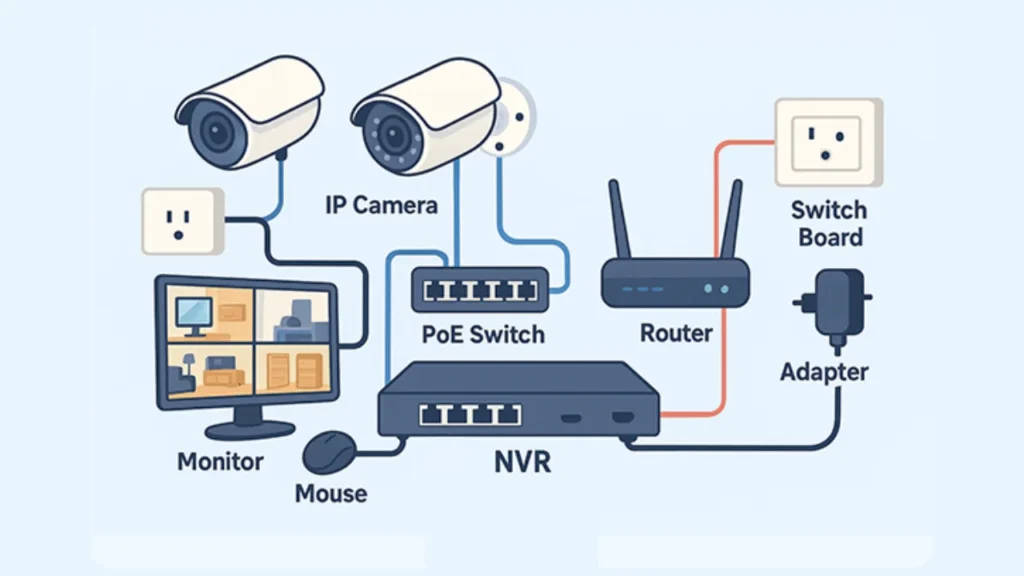
A Network Video Recorder (NVR) records video from the digital IP cameras over a network. The NVR systems rely on the cameras to process and encode the footage before sending it to the recorder for storage. This allows for better video quality and easier installation. These cameras just need to connect to the network. They don’t have to be wired to the recorder. NVR systems use Ethernet or Wi-Fi, offering a more scalable solution compared to DVRs.
DVR Security System Pros & Cons
A DVR security system is most popular choice for the home and business security due to its affordability and simplicity. It is often the best option for properties with existing analog infrastructure or those looking for a budget-friendly solutions. However, like any other technology, DVR systems come with their advantages and limitations. Now lets talk about the pros and cons of the DVR systems to help you to make a more informed decision.
DVR Security Systems
DVR systems offer a cost-effective solution for those who need basic security setup. Since DVRs work with analog cameras the initial setup cost is generally lower, making it ideal for smaller budgets. Also, the DVR systems are relatively straightforward to install, especially in properties that are already wired for analog cameras. The system also provides stable and reliable video recordings without much risk of signal interference.
The main downside of DVR systems is their reliance on older analog technology which limits image quality. Video footage of DVR is usually has a lower resolution than modern NVR systems, particularly when it is used with older cameras. The DVR systems are also less flexible in terms of scalability, as they require each camera to be connected directly to the recorder with coaxial cables. This makes expanding the system more difficult and can be problematic in larger setups.
Camera Type Analog
DVR setups rely on analog cameras, which are usually cheaper but miss out on the fancy stuff you get with digital ones. These cameras send their video feed straight to the recorder, where it gets turned into digital files and saved. Sure, they’re budget-friendly, but you won’t get the crisp picture or cool extras like facial recognition or smart motion alerts that come with the IP cameras in NVR systems.
Since DVRs are locked into analog cameras only, you don’t have much choice when picking your gear. Plus, those analog cameras tend to top out at lower resolutions, so the footage can look pretty grainy or blurry next to the sharp, high-def video from IP cameras in an NVR setup.
Cabling Coaxial BNC Cable
One nice thing about DVR systems is they run on coaxial BNC cables, which are pretty cheap and super common in older setups. If your place already has some of these lying around from a previous system, you’re in luck installation’s a breeze and you won’t be hunting down rare parts.
That said, coax isn’t perfect. The cables are thick and stiff so running them across a big property can be a real hassle. They don’t carry power either meaning you’ll need a separate power line for every camera which adds extra work. And if you’re trying to place a camera more than about 300 feet away you’re out of luck the signal just won’t reach.
System Flexibility
DVR systems are typically more rigid in terms of setup. They usually require all cameras to be connected to the same recorder and all wiring must be done through coaxial cables. This makes DVR systems ideal for straightforward smaller installations where the camera placement is fixed and not likely to change.
The flexibility of DVR systems is limited compared to NVR systems which can support both wired and wireless cameras. DVR systems also don’t offer the ability to add cameras to the system easily if the wiring is not already in place. As a result DVR systems are better suited for smaller setups with fixed camera placements and minimal expansion needs.
Image & Audio Quality
Picture quality in DVR setups has gotten better lately thanks to high-def analog cameras. It’s not quite up there with NVR systems but you still get solid video for everyday security jobs. Some of the newer DVRs can even grab sound through RCA plugs though that’s not super common.
Even with those upgrades DVRs lag behind NVRs on sharpness especially resolution. Analog feeds just aren’t as crisp or packed with detail as digital ones and audio is hit-or-miss too you often need extra gear to catch any sound.
NVR Security System Pros & Cons
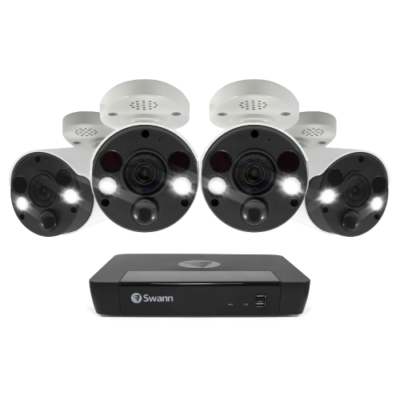
Network Video Recorder (NVR) setups have fast turned into the go-to pick for today’s security needs thanks to their cutting-edge tech and top-notch video clarity. NVR systems shine for homes or businesses that want room to grow easy tweaks and a setup that won’t feel outdated soon. Still no tech is perfect so NVRs bring strong perks along with a few drawbacks. Let’s break down the main upsides and downsides of NVR security systems to help you figure out if one fits your needs.
NVR Security Systems
NVR setups deliver top-tier video quality because they run on digital IP cameras that grab super-high-resolution footage. This makes them perfect for spots where clear pictures really matter. Plus they give you way more wiggle room you can go wired or wireless with the cameras. Since everything runs over the network you can add tons of cameras and NVR systems scale up easily so they’re awesome for big properties or businesses that plan to add more eyes down the road.
The catch is NVR systems cost more upfront than DVRs. Installation gets trickier too since it all depends on a solid network to move the data around. That means extra planning and setup especially if you’re not a networking pro. They also use more bandwidth so if your network is not set up right or you don’t have enough juice you might run into slowdowns or glitches.
Camera Type IP Cameras
NVR setups run on digital IP cameras and they bring a bunch of perks that beat analog ones hands down. These cameras shoot high-def video and pack smart tricks like motion alerts face recognition and they can grab both picture and sound. That turns an NVR into a beefy surveillance tool with way clearer and richer footage.
Sure IP cameras deliver killer quality and fancy extras but they cost more than analog models. Setting them up and tweaking settings feels trickier too especially if networks aren’t your thing. They also need regular checks and tweaks to stay online and working right over time.
Cabling Ethernet Cable
The image quality of DVR systems has improved in recent years with the introduction of high-definition analog cameras. While not on par with NVR systems DVRs can still provide decent video quality for basic surveillance needs. In some cases newer DVR systems can even support audio recording through RCA connections though this is less common.
Despite some improvements DVR systems still suffer from lower image quality compared to NVR systems particularly in terms of resolution. Analog video signals are typically not as sharp or detailed as digital signals and DVR systems may also have limited audio recording capabilities especially if additional equipment is needed for sound capture.
System Flexibility
One of the best parts of NVR systems is the freedom they give you. Cameras don’t need to run straight to the recorder they just have to be on the same network. That makes it easy to add new ones anywhere without pulling long cables. NVRs handle both wired and wireless cameras so you’ve got more options for where to put them and you end up with better coverage.
Of course that flexibility has a downside. You need a strong network that can carry all the video data. Getting cameras spread out over a large area set up right takes time and some technical skill to avoid problems.
Image & Audio Quality
NVR systems really shine when it comes to picture quality. They grab high-def video anywhere from 2MP up to 12MP or even more so the footage looks sharp and full of detail. Plus most IP cameras that work with NVRs can record sound too which gives you extra info for security or just keeping an eye on things.
The flip side is all that crisp video eats up storage and network bandwidth. That can drive up costs you might need bigger hard drives and a beefier network to keep everything flowing. And even though NVRs beat DVRs on quality stuff like network traffic jams or bad camera spots can still mess with your video and audio.
Which One Should You Choose?
Picking between NVR and DVR really comes down to what you need and how much you want to spend. If you want something cheap and straightforward for a small place or you already have analog gear in place a DVR is probably your best bet. But if you care about sharp video room to grow and the option to add cameras later without a headache go with an NVR. For setups that feel modern easy to tweak and ready for the future especially in bigger homes or businesses NVRs are the clear winner.
Additional Considerations Before Choosing NVR or DVR
Before you lock in your pick think about the size of the space you’re watching your current network setup and how sharp you need the video to be. NVR shines for big properties or tricky layouts that might grow later but you’ll need a rock-solid network and be ready to pay more upfront. DVR keeps things cheap and simple to install yet it won’t give you much wiggle room or top-notch pictures if you plan to expand. Also ask yourself if you want extras like checking feeds on your phone smart alerts or sound recording. Those come easier with NVR.
Conclusion
It all comes down to what you need how much cash you’ve got and how big your setup is. DVRs stay cheap and dead simple but they miss out on the flexibility of crisp video and cool extras you get with NVRs. If you want something that’ll keep up as you grow and deliver top performance NVR is the way to go. That said for small spots or tight budgets a DVR still gets the job done just fine. Figure out exactly what your security calls for and you’ll land on the right pick for your place.
At Borderless Solutions, we provide the best CCTV installation services tailored to your needs. If you’re still unsure about which security system to choose, we’re here to help. Contact us today for expert advice and a custom solution that fits your requirements.

